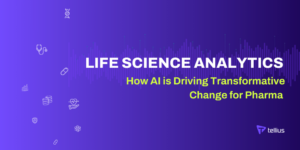
Healthcare organizations adopting a data-driven culture are set to derive major benefits in terms of improving care to patients and reducing the overall cost of their operations. According to a report by IDG, healthcare organizations are 82% more likely to see improvements in staff, inter-departmental, and stakeholder collaboration, while three-folding the likelihood to reduce operational costs by over 20%. And the timing for a more data-driven approach couldn’t be better for an industry that could be described as lagging when compared to others such as finance and marketing. With this said, let’s take look at how big data insights are helping the healthcare industry provide better care to patients, while simultaneously introducing cost and operational efficiencies to its systems and processes.
In This Post
Gaining Better Insight Through Data Standardization and Centralization
The amount of information available in modern healthcare is exponentially larger than it was just a decade ago. Pharmaceutical companies, hospitals and research institutions alike have been accumulating volumes of research and development healthcare metrics into vast databases, while simultaneously digitizing volumes of patient records. Furthermore, the US government has released vast stores of public healthcare information, including data from trials and information on patients covered under public insurance programs. According to Niall Brennan, Chief Data Officer and Director of Analytics for the Center for Medicare and Medicaid Services (CMS), “Data transparency facilitates a vibrant health data ecosystem, promotes innovation, and leads to better informed and more engaged healthcare consumers.”
This new availability of healthcare metrics across a range of sources will bring insights to a wide spectrum of factors that hinder optimal delivery of healthcare services. For example, the Indiana Health Information Exchange (IHIE) in the state of Indiana now connects over 30 000 healthcare providers in 17 states and 80 hospitals holding information on more than 10 million patients, giving 18 000 doctors access to this data – creating a veritable healthcare information ecosystem.
Seeing the Picture More Clearly Through Analytics
When applied to large sets of healthcare data, predictive analytics platforms can help providers not only improve cost efficiency, but also predict and prevent disease outbreaks, or save lives for that matter. Massachusetts General Hospital is using an analytics platform that prevents critical patient data from being missed during admissions and treatments, thus reducing risk to both patients and healthcare providers. The platform also minimizes surgical risks to patients by matching the right course of action to keep patients safe during and after operations. Also, Electronic Health Records (EHRs) are being used to better determine future risks to patients by making patient data instantly available to providers across the country.
Furthermore, predictive models deployed to patients’ EHRs can draw significant correlations between patients and their family members, communities, etc. – allowing healthcare providers to better understand and anticipate the causes of illnesses and disease outbreaks. Here’s an interesting read on how the Center for Disease Control (CDC) is employing big data in its ongoing fight against disease outbreaks.
Prediction Facilitates Effective Prevention
The era of big data, coupled with the availability of the necessary technologies to turn enormous swathes of data into actionable insights, creates new avenues for the healthcare industry to prevent the outbreak of diseases, discover cures faster and keep us all, as they say, fit as a fiddle. By harnessing the volumes of healthcare data residing across a vast country such as the US, healthcare providers and research institutions can position themselves on the front foot in an industry where foresight can mean the difference between life and death.
Search-powered data intelligence platforms, such as Tellius, are helping to narrow the gap further by simplifying the process of mining for key metrics. By combining disparate datasets seamlessly and delivering information in an easy-to-consume format through powerful vizualisations and predictive analytics, healthcare professionals can enjoy unprecedented access to key insights without requiring an information science degree to do so. For more information on how Tellius can help you make your data work for you, contact us at sales@www.tellius.com


